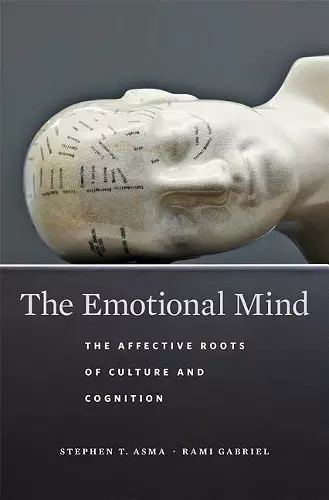The Emotional Mind
The Affective Roots of Culture and Cognition
Stephen T Asma author Rami Gabriel author
Format:Hardback
Publisher:Harvard University Press
Published:26th Apr '19
Should be back in stock very soon

Tracing the leading role of emotions in the evolution of the mind, a philosopher and a psychologist pair up to reveal how thought and culture owe less to our faculty for reason than to our capacity to feel.
Many accounts of the human mind concentrate on the brain’s computational power. Yet, in evolutionary terms, rational cognition emerged only the day before yesterday. For nearly 200 million years before humans developed a capacity to reason, the emotional centers of the brain were hard at work. If we want to properly understand the evolution of the mind, we must explore this more primal capability that we share with other animals: the power to feel.
Emotions saturate every thought and perception with the weight of feelings. The Emotional Mind reveals that many of the distinctive behaviors and social structures of our species are best discerned through the lens of emotions. Even the roots of so much that makes us uniquely human—art, mythology, religion—can be traced to feelings of caring, longing, fear, loneliness, awe, rage, lust, playfulness, and more.
From prehistoric cave art to the songs of Hank Williams, Stephen T. Asma and Rami Gabriel explore how the evolution of the emotional mind stimulated our species’ cultural expression in all its rich variety. Bringing together insights and data from philosophy, biology, anthropology, neuroscience, and psychology, The Emotional Mind offers a new paradigm for understanding what it is that makes us so unique.
With impressive mastery of the scientific and philosophical literature, The Emotional Mind is an ambitious work with sweeping scope and multidisciplinary character. Asma and Gabriel have written an impressively thorough volume, pulling together work in a variety of disciplines to present a detailed picture of the fundamental role of affective systems and processes in perception, cognition, decision-making, and social behavior. -- David Livingstone Smith, author of Less than Human: Why We Demean, Enslave, and Exterminate Others
The power of the emotions in our lives is obvious, yet many people prefer to stress the intellectual side of our species. When philosophers turn to the emotions, as in this fascinating book, something magical happens. We get a far more realistic view of human affairs by grounding our psychology in age-old impulses and strivings. -- Frans de Waal, author of Mama’s Last Hug: Animal Emotions and What They Tell Us about Ourselves
In The Emotional Mind, Asma and Gabriel have produced a scholarly work that adds significantly to the current literature. It uses cognitive science to show that affect is the neglected partner when it comes to imagining the construction of the modern human mind. This is a much-needed contribution. -- Antonio Damasio, author of The Strange Order of Things: Life, Feeling, and the Making of Cultures
An admirable accomplishment, bringing together evolutionary and ecological psychology; philosophy of mind and of psychology; and evolution of culture. This book has been called for since affective neuroscience came on the scene, and the foundational claim that emotions are shaped by and shape both internal cognition and the external world will be used to rethink human evolutionary adaptations of all kinds. -- Heidi M. Ravven, author of The Self Beyond Itself: An Alternative History of Ethics, the New Brain Science, and the Myth of Free Will
An ambitious study of the role of emotion in human cognitive and cultural development…Will likely play a significant role in reshaping scientific and philosophical discussions with respect to mind, emotion, and culture. * Choice *
A fresh and compelling take on the affective roots of human rationality, cognition, and judgment-making processes. -- Paul Rezkalla * Quarterly Review of Biology *
- Short-listed for PROSE Awards 2020 (United States)
ISBN: 9780674980556
Dimensions: unknown
Weight: unknown
448 pages